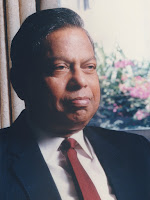Syamal Gupta - An Eulogy
I will remember Syamal Gupta, or Syamalda to me and many of his friends and colleagues, as a man
1.
of complete integrity
2.
of impeccable character
3.
of inconspicuous
charisma
4.
of
innate empathy
5.
of intuitive networking skill
6.
of self-effacing leadership, and
7.
of unbounded curiosity.
He had neither greed nor jealousy, and above all, he believed in plain living and high thinking. In short, he was more like the person described in Bhagavad
Gita: Chapter 2, Verse 71.
विहाय कामान्य:
सर्वान्पुमांश्चरति नि:स्पृह: |
निर्ममो निरहङ्कार: स शान्तिमधिगच्छति ||
vihāya kāmān
yaḥ sarvān pumānśh charati niḥspṛihaḥ
nirmamo nirahankāraḥ sa śhāntim adhigachchhati
That person, who gives up all material desires and lives free from a sense of greed, proprietorship, and egoism, attains perfect peace.
On 20 April 2022, the family of Syamalda—his wife Chandra Gupta, and his three daughters, Debjani Sen, Damayanti Gupta, and Anuradha Gupta—organised a memorial meeting in the auditorium of Bombay House. His friends and family packed the auditorium. Additionally, nearly one hundred persons joined the forum over Zoom, including Rajive Kaul, Rima Sen Mortemart, and me representing the Imperial College London Alumni Kolkata Chapter - Syamalda was a distinguished alumnus of Imperial College. Alice Gast, the President of Imperial College, joined from London. Each speaker paid rich tribute to Syamalda.
Syamalda began his career with the Tatas in 1956, at age 22, as a trainee
in TISCO. He moved up through many companies of the Tata Group to Tata Exports
and Tata Sons. He rose to hold senior positions such as Director Tata Sons and
many Tata group companies, including Chairman of Tata International Limited.
He was deputed to Singapore to start Tata’s first significant
international investment, Tata Precision Industry. In 1982 he was appointed
Managing Director of Tata Exports, now called Tata International Limited, which
was the global business arm of the Group. He expanded the company’s activities
across geographies and businesses into new areas.
He was the Honorary Consul General of Namibia in India and sat on the
Presidential Advisory Councils of Tanzania, Uganda, Zambia, and Ghana.
He retired from active service in 2009. After retirement, he continued to
contribute his expertise to the Group’s charitable work, serving as a Trustee of
the Tata Medical Center Trust and Chairman of Tata Eastern
Medical Trust until his last day.
He led the creation of Tata Medical Center in New Town, Kolkata, a
philanthropic state-of-the-art Cancer Care Center. This medical centre has
fulfilled a long-term requirement in eastern India of comprehensive cancer
care.
If you asked what he brought to Tata, the answer would point to the
collaborations - with BP, Rolls Royce, Mitsubishi, AIG, Bratten Witter, and
MacDonald Douglas.
In his admission, he was not a businessman but a professional. He
believed that short-term gain is a long-term disaster. He thought that if you
followed technology, money would come.
Tata’s philosophy of donating the profits back to society influenced him
profoundly. He knew that the founder of Tata didn’t start rich. When the
company began 120 years ago, the founder told his sons that they should ensure
good roads, schools, hospitals, and living conditions wherever they built. That’s
the culture at Tata - a belief that one can live well if the society lives
well. What comes from the people must go back to the people; this is a
statement he heard, listened to, and followed in his life.
Recently, Imperial College Alumni Stories updated Syamalda’s profile after
his death. It recalls
that he was a Fellow of Imperial College, a Visiting
Professor at the Department of Mechanical Engineering, and a member of the
Energy Futures Laboratory Advisory Board. He was also a member of the Advisory
Board of Quest Partners, a management consultancy firm, and the Dean’s Advisory
Board at Schulich School of Business, York University.
 |
| Syamal Gupta (right), Keith Onion, Rector, Imperial College (centre), and Hirak Sen (left) - Kolkata, 8 January, 2014 |
About the innovation at Imperial College, Syamalda said, “My training at
Imperial shaped my approach to innovation because you spend some time studying
what’s been done in the past, but it’s more about moving forwards. Imperial
starts where others have ended.” Such a statement makes all of us here proud.
In India, he grew up seeing coal-fired chulha’s that filled the homes
with smoke. That experience motivated him to investigate greener solutions to
generating energy. He recognised that solar power is renewable, sustainable,
pollution-free, and distributed, and he initiated a solar power venture. In
the 1980s, he brought commercial solar power to India.
In his autobiography, Quintessentially Tata (2020), he summed up his Tata
innings of over half a century. This book is a must-read for all those simply
curious or actively interested to know about the Tata visionaries and the
working of Bombay House, the head office of the Tata group in Mumbai. The book
is available on Amazon. It is well worth reading.
I first met Syamalda three decades ago in Mumbai. Eric Ash, Rector of
Imperial College, was visiting Mumbai. On that occasion, Syamalda invited
Imperial Alumni from India to meet Eric and share their thoughts with him. The
business session was held during the day at the Taj Mahal Towers. Later in the
evening, Syamalda hosted a dinner at the banquet hall of the Taj Palace Hotel
for the Imperial Alumni and many eminent citizens of Mumbai that were
interested in science and technology.
During that meeting, Syamalda profoundly influenced me. Since then, he
kept in touch with me via email and an occasional call over the phone. Conversations
with him covered many subjects, and they always inspired me. I am blessed to
have known him.
I will now end my eulogy by recalling an incident in 2019 which set an
alarm bell in me. My wife and I were visiting Mumbai and staying in Oberoi
Towers, located literally across the road from Syamalda’s home in Nariman
Point. I had planned to see Syamalda at his home at his convenience. So I
called him from the hotel and told him that we were across the road and would
like to visit him and Chandradi at their convenience.
However, I was alarmed when Syamalda quietly excused himself in a
somewhat strained voice, citing some preoccupation. This was most unlike him. Typically,
he would have warmly invited us for tea or dinner. Thus alarmed I called a
common friend to inquire whether all was good with Syamalda. Sadly, the friend
told me that he had cancer and was undergoing chemotherapy. My heart fell.
After that, he and I continued to be in email and telephone contact many times
over the past three years, but he never mentioned his disease. When I asked him
about his health, he said he was not very well.
That was Syamalda. He kept his trials and tribulations to himself and
brought only positive thoughts to his friends.
He lived his life well, and his values, thoughts and deeds touched many
lives, including mine. I salute the man.
[ Syamal Gupta: 15 April 1934 - 1 April 2022]



Excellent
ReplyDeleteThank you
DeleteWonderful tribute to an iconic corporate figure who touched many lives .
ReplyDeleteThank you
DeleteTouched. I had met him a few times at Tata Centre Building regarding mutually interesting works. He was a noble man.
ReplyDeleteThank you.
DeleteExcellent description of a real achiever .
ReplyDeleteThank you.
ReplyDelete